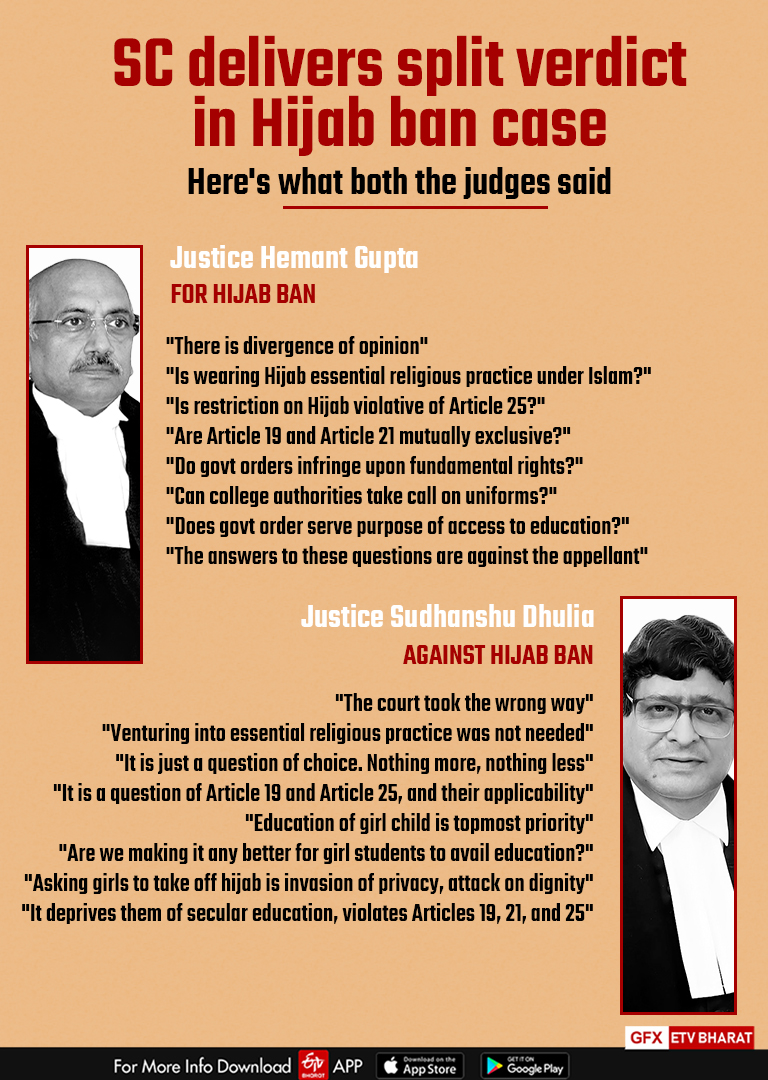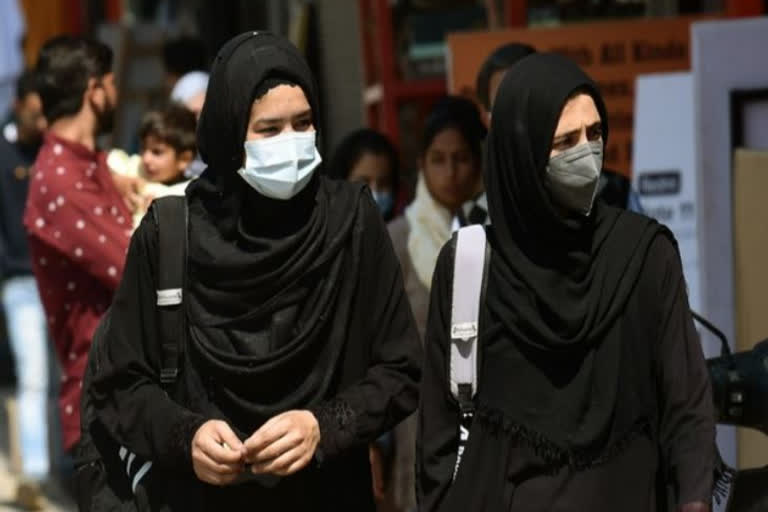New Delhi: The Supreme Court on Thursday delivered a split verdict in the Hijab ban case with one judge pronouncing in favor of the Hijab ban imposed by the Karnataka High Court, and the other one pronouncing against it. The matter was therefore directed to be heard by Chief Justice of India UU Lalit.

Here is what both the judges said in their orders and what it entails in the case.
- Justice Hemant Gupta dismissed the pleas challenging the Hijab ban imposed by Karnataka HC, whereas Justice Sudhanshu Dhulia set aside orders by Karnataka HC and quashed the government orders that empowered college authorities to take decisions on the issue.
- Reading his opinion first, Justice Hemant Gupta said there is a 'divergence of opinion' in the matter. He said he has framed 11 questions in his order, highlighting the key aspects of the issue. In his order, Justice Gupta questioned whether wearing Hijab is an essential religious practice under Islam and if the restriction on Hijab is violative of Article 25. He further asked if the college authorities have the right to make decisions regarding the uniforms of the students, adding if Article 19 of freedom of expression and Article 21 of the right to privacy are mutually exclusive.
- In another one of his questions, Justice Gupta asked if the government orders are an infringement upon fundamental rights. "Does govt order serve the purpose of access to education?" he asked. "The answers to these questions are against the appellant," he concluded, thereby dismissing the pleas against Karnataka HC orders.
- Opining against the Hijab ban, Justice Dhulia, in his orders said that 'the court took it the wrong way and venturing into essential religious practice was not needed'. He also quashed the government orders passed on February 5, 2022, which empowered the college management committees to take a decision on the issue.
- Further saying that it is just a question of choice, he reiterated the importance of Article 19 and Article 25, and their applicability. "This is simply a matter of ...choice. Nothing more, nothing less," he said while reading his orders.
- Justice Dhulia said that the aspect he prioritizes most here is the education of girls in India. "The question this Court would put before itself is also whether we are making the life of a girl child any better by denying her education merely because she wears a hijab," he said.
- "By asking girls to take off hijab before they enter the school gates is an invasion of their privacy, then an attack on their dignity and ultimately a denial of secular education, violative of Articles 19(1)(a), 21, and 25(1)," he added, setting aside Karnataka HC's March 15 decision to ban hijab in schools and colleges.
- With the two-judge bench split over their difference in views, the matter shall be placed before CJI UU Lalit through a three-judge bench. Meanwhile, state Education Minister BC Nagesh said that he welcomes the SC's decision, while the Karnataka government's ban on hijab on campus shall stay valid until further orders.
- Several people from the political and social circles reacted to the verdict, including Karnataka CM Basavaraj Bommai and AIMIM chief Asaduddin Owaisi. While Owaisi alleged that the Karnataka HC misused the 'Quranic commentaries', Bommai said the final verdict on the hijab row is very important as its impact is not restricted to Karnataka but on the whole country. "There were a lot of dimensions to the hijab row. The demand for students is different and the government order is different. Since it involves national and international issues, the government is expecting a clear verdict from the court," he added.
- A full bench of the Karnataka High Court had dismissed petitions filed by Muslim girls against the ban on wearing Hijabs in schools and colleges on March 15. The court had cited that wearing Hijab is not an essential practice in Islam and Article 25 of freedom of religion is subjected to certain restrictions.



